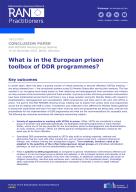Details
- Publication date
- 8 June 2023
- Author
- Directorate-General for Migration and Home Affairs
- Country
- Germany
- RAN Publications Topic
- Deradicalisation/disengagement and exit work
- Prison and probation
Description
In recent years, there has been a growing number of violent extremist or terrorist offenders (VETOs) entering — and being released from — the correctional systems across EU Member States after serving their sentence. This has resulted in an increasing focus being placed on their distancing and disengagement from extremism and violence as a key outcome of the incarceration period of these inmates. A growing number of tertiary prevention interventions have been implemented across the EU and there is now a large variation among EU Member States with respect to deradicalisation, disengagement and resocialisation (DDR) programmes and tools used in the work with VETOs in prison. The goal of this RAN PRISONS Working Group meeting was to explore the various tools and programmes across the EU dealing with DDR in prison.
Practitioners and researchers from different EU Member States gathered to share their experiences and learn from each other what key tools and programmes are being used, what are the preconditions for the implementation of DDR programmes and what are the recommendations for successful ones. The following key outcomes summarise the meeting’s overarching insights:
- Variety of approaches to working with VETOs in prison: Often, VETOs are considered a unique group of prisoners and addressed specifically via dedicated treatment programmes in many Member States, where one of the key priorities for the incarceration period is disengagement and deradicalisation. In many contexts, however, VETOs are offered general reintegration and rehabilitation measures the same way as for other offenders.
- Specialised DDR programmes dedicated to VETOs also build on existing expertise, methods and approaches that are used with other inmates too, such as classic social work, cognitive behavioural therapy, anti-violence training and reintegration support. These methods, however, need to be adapted to the specifics of the (often heterogenous) target groups and individual radicalisation pathways, as well as to how the deradicalisation process works.
- What is specific to DDR programmes as compared to general rehabilitation interventions offered to all inmates is in how the target group is defined and selected, in the increased duration and intensity of the care, emphasis on certain aspects of the work with inmates, or additional methods being used (such as religious counselling, narrative and worldview work, mentoring in the transitional phase). Knowledge about radicalised environments and radicalisation processes is essential in order to adapt methods adequately.
- DDR programmes have some common elements such as risk assessment based on VERA-2R and similar tools, a multi-agency/multi-professional approach, individual work with inmates around disengagement and strong focus on reintegration after release.
- In general, there is a hierarchy of needs addressed via DDR work, although comprehensiveness and methods might vary — starting from a risk and needs assessment, individualised treatment plan, addressing basic needs and trust building, work on stabilisation and transition management (e.g. mentoring and couching methods), work on identity, narratives and worldviews, and social reintegration support.
- Disengagement is intertwined with successful reintegration. Education and job support programmes that are available also for other offenders for reintegration are considered key elements in the DDR process in supporting disengagement.
- Ideology, narratives, worldviews and religion are addressed by many programmes although the goal is not necessarily changing the inmates’ beliefs (deradicalisation).
- Key preconditions for DDR programmes to be beneficial and effective include: well-trained and sufficient staff, minimum standards and good conditions in prison environments, prison leadership commitment and prioritisation of DDR, better tools for risk and needs assessment, political support, and improving the public perception and expectation regarding the role of DDR in prison.

